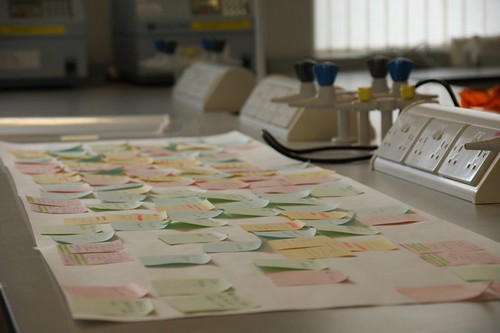The current iGEM team for my university are in the lab next door to me and busy doing all the traditional iGEM stuff like playing around excitedly with ancient bits of equipment (and some nice new stuff) and deciding what their mascot is:
Mr E. Coli Head was an early favourite
There have been massive thought-storming sessions, (some involving cake) and the promising beginnings of what looks like an interesting project. They have a beautiful wiki as well (much better than our little psychedelic page!) and you can follow them on Twitter.
One of the hardest parts of it, is trying to come up with what my PI called 'the pitch', the idea that is going to explain your project, why you are doing it, what it's for and (unfortunately seems to be a requirement) how it's going to save the world. The problem is that there are ~150 other teams also trying to think of a pitch, and there's quite a bit of pressure to find something new and original.
This might change as the competition gets bigger, it might become more acceptible to work on smaller ideas like "making a better assay for such and such" or "improving on the work done by a team last year". This I think would be an improvement, smaller ideas have a greater chance of actually working. Many of the smaller and less well funded teams have embraced this, and have very simple and succinct project ideas (i.e "biobrick protein A, put it into E. coli and test it").
Despite not being involved it is still fun to watch the work from the sidelines, and it means I have more time to look through what other teams are doing and to look at the process of iGEM more objectively. I might put up a few more posts about it over the summer (any time I'm too busy to go through papers probably!) but if you want to watch their progress I'd suggest following them, and watching the whole drama of lab work through undergrad-project eyes.
This is there project as well. They have help when they ask for it, and supervision when required. But mostly they've been just thrown into a lab with a load of equipment just to see what happens...




















1 comment:
woohoo! yay igem! :)
Post a Comment